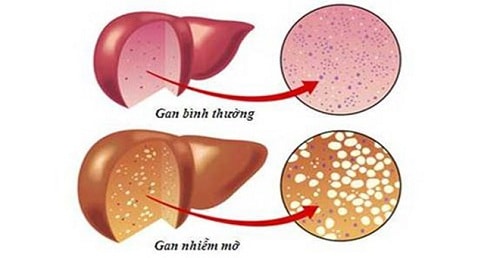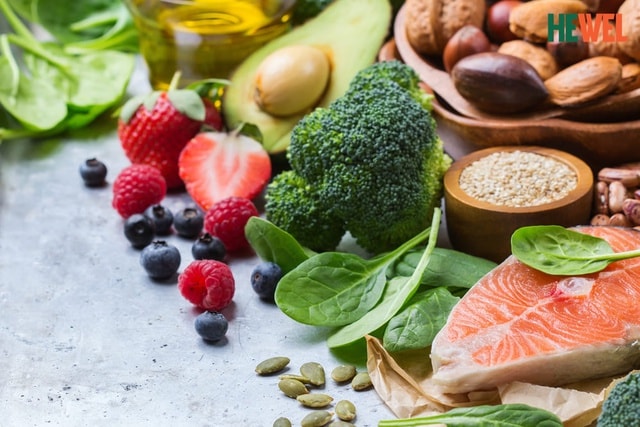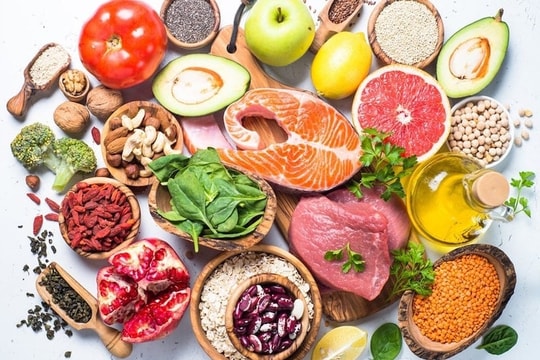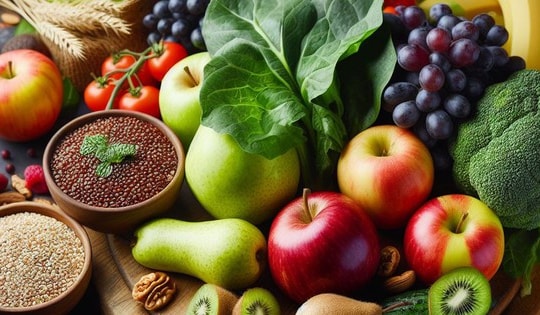The Mediterranean diet is considered good for people with fatty liver disease.
Adjusting the diet for patients with fatty liver disease can limit the risk of worsening and dangerous complications.
Thin body, no alcohol but still have fatty liver due to metabolic disorder
Mr. Pham Van Thang, 62 years old (in Duong Noi, Ha Dong, Hanoi) was very surprised when his son took him for a general check-up and the doctor diagnosed him with fatty liver. While he looked quite thin, did not drink alcohol often, and did not show any signs of pain or discomfort, only occasional bloating and indigestion, he thought it was due to a relapse of his stomach disease. The doctor who examined him explained that he had fatty liver due to metabolic disorders.
Ms. Nguyen Thuy, 47 years old (Ngo Quyen, Hai Phong) was diagnosed with fatty liver due to metabolic disorder during an ultrasound health check more than 20 years ago. At that time, she was also very thin, weighing less than 40 kg. Ms. Thuy is not addicted to alcohol, cannot eat fatty foods, and likes to eat green vegetables, shrimp, and fish... The ultrasound results 1 month ago showed a grade 1 fatty liver. The doctor said that she does not need to use any medicine because there is no medicine to treat fatty liver, but she needs to continue to maintain a healthy, scientific diet and exercise...
Previously, according to the old concept, people often thought that fatty liver disease was divided into two types: alcoholic fatty liver disease and non-alcoholic fatty liver disease. Non-alcoholic fatty liver disease is often proportional to obesity and metabolic syndrome in most patients. Therefore, the latest recommendations have introduced a new, broader, more correct concept of metabolic fatty liver disease.
 |
Fatty liver is a condition in which excess fat accumulates in the liver, hindering liver function. |
According to Associate Professor, Dr. Dao Viet Hang - Lecturer of the Department of Internal Medicine, Hanoi Medical University, fatty liver disease related to metabolic disorders is currently a common and increasing disease. Fatty liver disease is not only related to hepatitis B and C viruses but also related to obesity, metabolic disorders, diabetes, etc.
In normal people, the amount of fat in the liver only accounts for 2-4% of the liver's weight. When the amount of fat in the liver is greater than 5%, it is called fatty liver. Metabolic diseases such as obesity, overweight, high blood pressure, dyslipidemia, etc. will increase the deposition of fat in the liver and cause fatty liver. This hinders the normal functioning of the liver and if the disease is not managed, it will become more severe and cause metabolic disorders in the body.
Mediterranean diet is good for people with fatty liver disease
Associate Professor Dao Viet Hang said: In Vietnam, in recent years, when there has been a change in the nutritional regime towards Westernization, it has also shown that in specialties such as endocrinology and nutrition, the rate of obese patients, the rate of patients with dyslipidemia and diabetes has increased significantly.
There is currently no medical treatment for non-alcoholic fatty liver disease. Therefore, maintaining a healthy diet, getting enough sleep, and exercising regularly are the best ways to prevent liver damage from starting or reverse fatty liver disease when it is in its early stages.
 |
The Mediterranean diet is considered good for people with fatty liver disease. |
Dr. Annie Guinane, a registered dietitian at the Fatty Liver and Metabolic Disease Clinic at the University of Chicago Medicine (USA), said that experts often advise patients with non-alcoholic fatty liver disease to drink 1-3 cups of coffee per day, eat 4 tablespoons of olive oil per day and follow a Mediterranean diet, which emphasizes mainly eating plant-based foods and healthy fats.
The Mediterranean diet is a popular diet that has been popular since the 1990s, known more as an eating pattern than a strict diet.
The Mediterranean diet emphasizes eating fruits, vegetables, whole grains, beans, nuts, legumes, olive oil, flavorful herbs and spices; fish and seafood at least a few times a week; poultry, eggs, cheese and yogurt in moderation, and reserving sweets and red meat for special occasions.
Coffee:Caffeine may reduce abnormal liver enzymes in people at risk for liver disease.Green vegetables:This is a good food for people with fatty liver, it helps reduce cholesterol in the blood and liver cells.Fatty fish:The Mediterranean diet encourages regular consumption of certain types of fish such as salmon, sardines, tuna, etc., which are rich in omega-3 fatty acids. Omega-3 helps improve the amount of fat in the liver and is an effective anti-inflammatory.Olive oil: Rich in omega-3 fatty acids which help reduce liver enzyme levels and maintain proper weight control.Fruit:Regularly eat fruits such as: lemon, orange, tangerine, grapefruit, ripe apple, etc. because they are rich in vitamins, minerals, fiber, which help reduce fat in the blood and liver cells.
In addition to being beneficial for people with non-alcoholic fatty liver disease, the Mediterranean diet has been linked to a reduced risk of heart disease, and it has also been shown to lower blood pressure and LDL cholesterol. This diet tends to be consistent with the American Diabetes Association's dietary guidelines. That's important because both heart disease and diabetes are risk factors strongly linked to fatty liver disease.
Expert advice to protect a healthy liver
Associate Professor, Dr. Dao Viet Hang said that there is currently no targeted drug treatment for fatty liver disease. The most basic and important control measure for people with metabolic fatty liver disease is weight loss through a combination of following the doctor's treatment regimen, building a reasonable and scientific diet and exercise regimen.
People with fatty liver disease should maintain regular exercise (120 - 150 minutes/week at moderate to high intensity). A diet high in fat and fried foods, or a diet high in starch can also cause fatty liver disease, so it should be limited.
If a person with fatty liver is being treated for the disease but still uses alcohol, it will not achieve the desired effect. In addition, not only people who have been infected but also normal people need to limit the use of beer, alcohol and stimulants.
If you do not know how to choose food, you can ask for nutritional advice from a nutritionist or your doctor to advise on the most suitable nutritional menu. This helps ensure nutrition, health and the ability to recover from illness.







